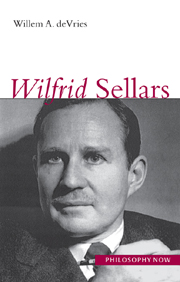Book contents
- Frontmatter
- Contents
- Preface
- Abbreviations
- 1 Sellars's philosophical enterprise
- 2 Sellars's philosophy of language
- 3 Categories, the a priori, and transcendental philosophy
- 4 Sellars's nominalism
- 5 Knowledge and the given
- 6 Science and reality
- 7 Intentionality and the mental
- 8 Sensory consciousness
- 9 Practical reason
- 10 The necessity of the normative
- Notes
- Bibliography
- Index
3 - Categories, the a priori, and transcendental philosophy
- Frontmatter
- Contents
- Preface
- Abbreviations
- 1 Sellars's philosophical enterprise
- 2 Sellars's philosophy of language
- 3 Categories, the a priori, and transcendental philosophy
- 4 Sellars's nominalism
- 5 Knowledge and the given
- 6 Science and reality
- 7 Intentionality and the mental
- 8 Sensory consciousness
- 9 Practical reason
- 10 The necessity of the normative
- Notes
- Bibliography
- Index
Summary
The basic formal and material relations between language and the world were the topics for Chapter 2. There are, however, also important structural features of languages and the more abstract conceptual frameworks they embody that need to be examined before we begin to look at Sellars's substantive views in metaphysics and epistemology. These features include categorial structure, the conception of a priori truths, and the possibility of specifying transcendental conditions for empirically meaningful languages in general.
Categories
The ontologist asks, “What is there?” An answer at the level of individual detail (“Well, there's me, my coffee cup, the dog sitting at my feet, the tree I see outside the window …”) is not the point. Rather, the ontologist seeks to know what kinds of things there are. But moving to kinds rather than individuals is of little help if every kind counts. (“Well, there are people, coffee cups, dogs, trees …”) Traditionally, then, philosophers have sought to construct or discover a set of highest or most general kinds, and called them ‘categories’. The notion of a category, however, has not been fixed and well-defined over the history of philosophy. Because they are highest kinds, there is something ultimate in the notion of a category: things of different categories have nothing in common, save perhaps certain transcategorial characteristics shared by everything, regardless of kind (e.g. being and identity). The serious category theorist also seeks an exhaustive set: a kind for everything and everything in its kind.
- Type
- Chapter
- Information
- Wilfrid Sellars , pp. 57 - 66Publisher: Acumen PublishingPrint publication year: 2005



